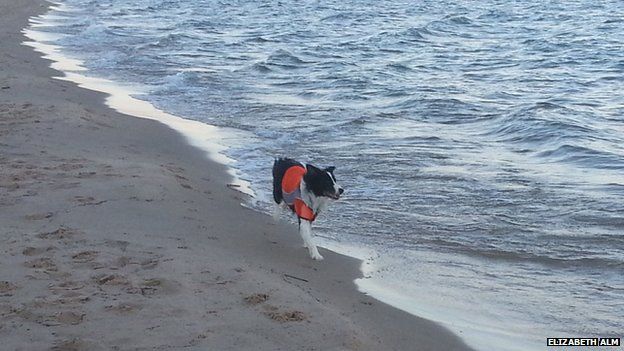Sheep dog patrols may curb seaside bacterial infections
- Published

Border Collies may be an effective weapon against E. coli infections at the seaside according to a new study.
Researchers found that the hard working sheep dogs were successful at keeping seagulls away from beaches.
Gull dropping are known to be a source of E. coli bacteria, which can lead to abdominal cramping and diarrhoea in humans.
High levels of the bug are a leading cause of beach closures in many parts of the world, including the UK.
The bacteria are commonly found in human and animal faeces and can end up in the seas through rain water run off or from sewage.
Seagulls have been implicated in the spread of resistant versions of the bug. A recent report showed that around a third of E. coli samples taken from the birds were resistant to more than one antibiotic.
Shore patrol
In this new study, researchers assigned the dogs to 200-metre stretches of beach along the shores of Lake Michigan in the US, which were patrolled for parts of the summer season. Half way through the dogs were switched to untreated sections.
Populations of Ring-Billed gulls have soared in the region since the 1970s with numbers increasing by 10% per year.
The collies, known for their intelligence and their herding abilities, disturbed the seagulls and kept them from landing on the beaches.
"Most of the time, the dogs were kept on their leads," said Dr Elizabeth Alm from Central Michigan University, who led the study.
"They were released with the leads dropped, only when their handler directed them to chase gulls. Then the dogs were called, they would circle back, and the handler would pick the lead back up."
Over the course of the summers of 2012 and 2013, the scientists recorded the number of birds at each section of beach while water and sand samples were collected and tested for E. coli.
They found that the bacterial counts were significantly lower on those sandy stretches where the dogs had kept the gulls at bay.
However the benefit didn't last through the whole season and the researchers found that later in the summer, bacterial numbers had risen once again. Dr Alm believes that the timing of the dog patrols is crucial to their effectiveness.
"If the E. coli establish in the sand early in the season, they appear to be able to persist, and probably even grow in the sand so that even though the dogs can remove the gulls from the beach later in the season, this late reduction in gulls does not translate in to a late season reduction in E. coli."
One key question though was the worry that the dogs themselves might increase the levels of E. coli if they had to answer nature's call while working on the beach.
"These were professional working dogs," said Dr Alm.
"They were given ample opportunity to take care of their "business" before going to work. They didn't often poop on the beach, but if they did it was immediately picked up by their handler and disposed of off the beach."
The research has been published at the annual meeting of the American Society for Microbiology.
Follow Matt on Twitter.
- Published8 May 2014
- Published15 April 2014
- Published4 April 2014